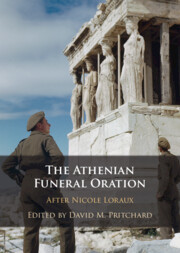Book contents
- The Athenian Funeral Oration
- The Athenian Funeral Oration
- Copyright page
- Contents
- Figures and Tables
- Contributors
- Foreword
- Preface
- Abbreviations
- 1 The Funeral Oration after Loraux
- Part I Contexts
- Part II The Historical Speeches
- Part III The Literary Examples
- 8 Gorgias’ Funeral Oration
- 9 Authorship and Ideology in Lysias’ Funeral Oration
- 10 Corrupting the Youth in Plato’s Menexenus
- 11 ‘To Gloat Over Our Catastrophes’: Isocrates on Commemorating the War Dead
- Part IV Intertextuality
- Part V The Language of Democracy
- References
- General Index
- Index of Sources
10 - Corrupting the Youth in Plato’s Menexenus
from Part III - The Literary Examples
Published online by Cambridge University Press: 11 January 2024
- The Athenian Funeral Oration
- The Athenian Funeral Oration
- Copyright page
- Contents
- Figures and Tables
- Contributors
- Foreword
- Preface
- Abbreviations
- 1 The Funeral Oration after Loraux
- Part I Contexts
- Part II The Historical Speeches
- Part III The Literary Examples
- 8 Gorgias’ Funeral Oration
- 9 Authorship and Ideology in Lysias’ Funeral Oration
- 10 Corrupting the Youth in Plato’s Menexenus
- 11 ‘To Gloat Over Our Catastrophes’: Isocrates on Commemorating the War Dead
- Part IV Intertextuality
- Part V The Language of Democracy
- References
- General Index
- Index of Sources
Summary
Compared to other extant examples, Plato’s Menexenus presents an unusual funeral speech: an oration delivered by Socrates, embedded within a Platonic dialogue and supposedly written by Pericles’ lover, Aspasia, whom Socrates claims as his own tutor in rhetoric. Nicole Loraux’s The Invention of Athens convinced almost all of the necessity of reading this speech alongside the others, without, however, investigating Plato’s own political and philosophical aims. Building on others, this chapter reopens the question of the dialogue’s tone. Is the fictional Socratic funeral speech ironic or serious, or somehow both? In order to approach this question, it is necessary, first, to examine the speech’s intertextual relations with Pericles’ funeral speech in Thucydides. Then, with the gender politics of this speech in mind, it will be possible to grasp the largely neglected significance of Aspasia, both as a woman and a foreigner. These considerations lead to the conclusion that Plato had both a critical and a constructive purpose: critical, in challenging the Periclean presentation of democratic courage, and constructive, in providing a kind of political therapy for democratic citizens, who stood, albeit unwittingly, in need of a healthier and more coherent self-understanding.
- Type
- Chapter
- Information
- The Athenian Funeral OrationAfter Nicole Loraux, pp. 221 - 240Publisher: Cambridge University PressPrint publication year: 2024
- 1
- Cited by



